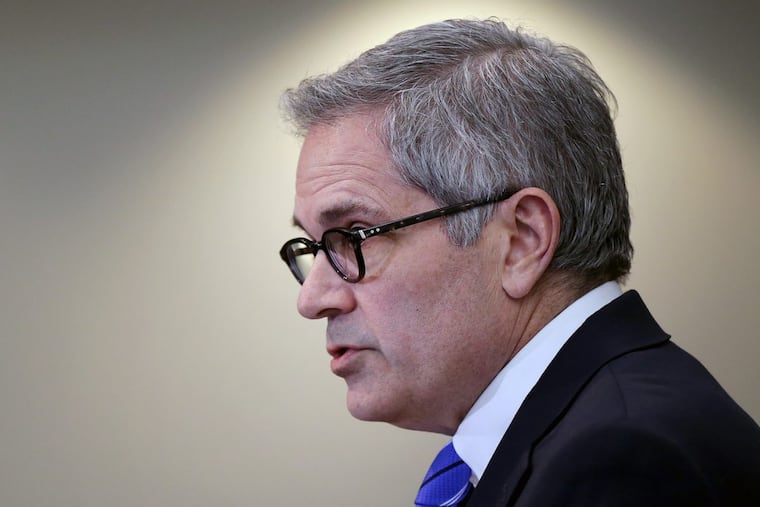Larry Krasner: Time to rethink probation and parole | Opinion
We need sensible policy changes needed to restore faith in our justice system, reduce the overly-expansive scope of community corrections, focus assistance on those people most in need, reward people for good performance, and overall, increase public safety and rehabilitation.

As longtime leaders in criminal justice, we have seen a deeply unsettling trend in the way probation and parole – sometimes called "community corrections" – have become overused and too often serve as a gateway to reincarceration based on the smallest of missteps. That's why we recently joined with 45 fellow prosecutors nationwide who believe that community corrections needs to be downsized and made rehabilitative, not only because that will make us safer, but because it will fortify trust in our justice system for millions of Americans.
When community corrections was founded in the 1800s, it was viewed as a highly individualized way to curb the purely punitive sentence of imprisonment with an alternative to incarceration (probation) or a release valve for those who did well during incarceration (parole).
But since 1980, it has grown far beyond what its founders ever could have imagined. The number of people on probation and parole has increased four-fold, peaking at 5 million individuals – or one out of every 53 adults – before declining slightly of late. That is twice as many people as are incarcerated in America, and more people than live in half of all U.S. states.
Often thought of as a grant of mercy or slap on the wrist, parole and probation are a deprivation of liberty and can serve as an unnecessary trip wire back into incarceration. Four out of 10 people entering our prisons and jails were on parole or probation at the time of their reincarceration. Often that stay behind bars is not for a new arrest, but simply for violating a technical condition of release like missing appointments or drug use.
A pair of studies by the Columbia University Justice Lab vividly lays out how this is contributing to incarceration, but not enhancing public safety, around the nation.
In New York, although both Mayor Bill de Blasio and Gov. Andrew Cuomo agree that the notorious Rikers Island jail should close, and the jail population has declined to lows not seen since the 1980s, the only population rising in Rikers is people accused of technical parole violations. New York's parole failure rate of 47% is substantially higher than the national average of 28%. Not surprisingly, 29.5% of those entering New York's prisons are incarcerated for technical violations.
Pennsylvania has the highest incarceration rate in the Northeast, and the third-highest community corrections rate in the country. The number and rate of people supervised by parole in Pennsylvania is the highest in the nation – three times the national average. An astonishing one out of 22 Philadelphians is being supervised by probation or parole.
This hefty contribution to the state's incarceration rate comes at a great cost and has no apparent public safety benefit. One-third of Pennsylvanians in prison are there for a parole or probation violation at an annual cost of $420 million. Half of those in Philadelphia's jails are in on parole or probation detainers. Yet research by the Council of State Governments shows that placing people on probation following release from prison or jail has no impact on their rearrest rates.
Several states have tried to reduce both the footprint and harmful outcomes of these practices. When Arizona gave people "earned discharge" time off their probation terms, the state not only reduced probation violations by 29 percent, but achieved a 21 percent decline in arrests of people on probation, realizing $392 million in averted costs. When Louisiana capped the amount of time someone could receive for technical violations at between 15 and 45 days, there was a 22 percent decline in returns to incarceration for new arrests, saving over 2,000 beds and $17 million.
Pennsylvania State Sen. Anthony Williams and New York Assembly Member Walter Mosely have filed legislation in their respective states to address this issue. These proposed reforms would shorten probation and parole terms, grant people 30 days of earned discharge time for every 30 days of success under supervision, and cap the amount of time someone could receive for a technical violation.
These are the kinds of sensible policy changes needed to restore faith in our justice system, reduce the overly expansive scope of community corrections, focus assistance on those people most in need, reward people for good performance, and overall, increase public safety and rehabilitation. We hope that prosecutors around the nation will rally around the need for reform and use their influence to help chart a more positive pathway for all members of our community.
Larry Krasner is the District Attorney of Philadelphia.
Miriam Krinsky is a former federal prosecutor and Executive Director of Fair and Just Prosecution, a national network of elected prosecutors working towards common-sense, compassionate criminal justice reforms.